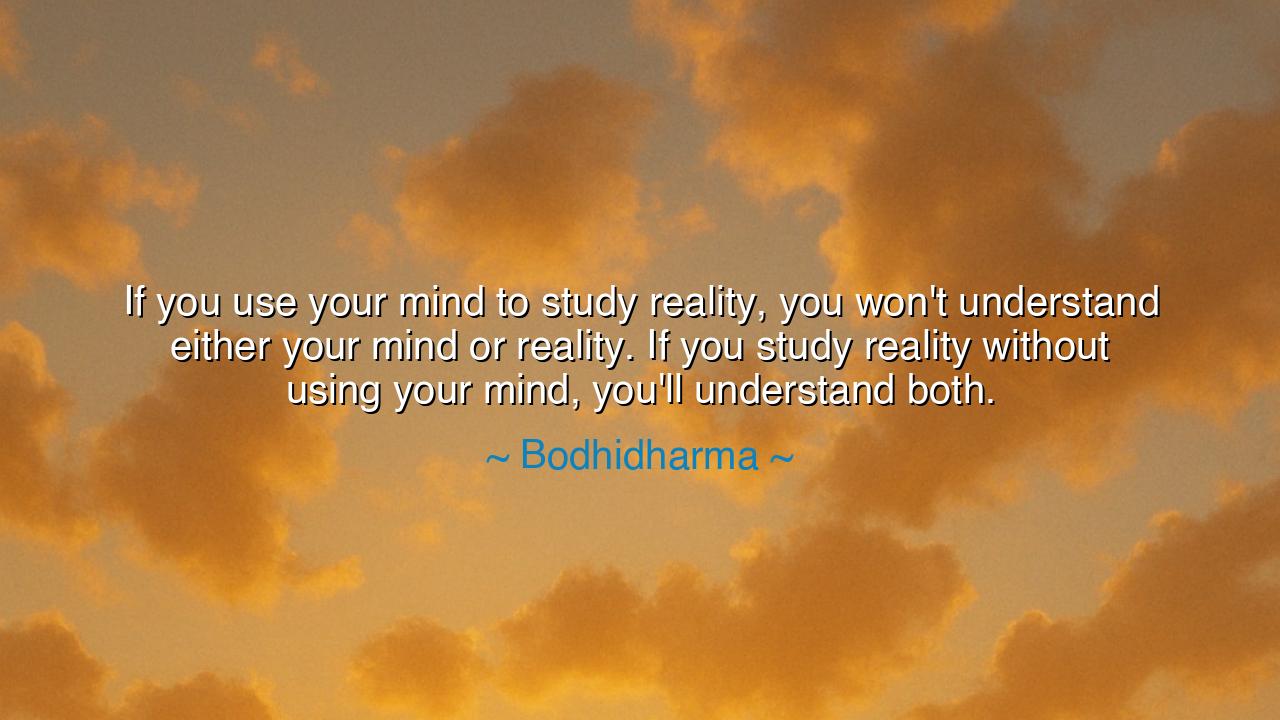
If you use your mind to study reality, you won't understand
If you use your mind to study reality, you won't understand either your mind or reality. If you study reality without using your mind, you'll understand both.






“If you use your mind to study reality, you won't understand either your mind or reality. If you study reality without using your mind, you'll understand both.” — Thus spoke Bodhidharma, the sage who carried the flame of enlightenment from India to China, the father of Zen, whose words were thunder in silence and light within shadow. This saying, veiled in paradox, calls not to the intellect but to the soul. It reminds us that truth cannot be grasped by thinking alone, that the mind — though sharp as a blade — cannot cut through the veil of illusion by its own edge. For the mind is both the seeker and the obstacle, and only when it grows still, like a lake untroubled by wind, does it reflect the reality it seeks to know.
To use the mind to study reality is to approach the infinite with a tool too small for its measure. The mind, brilliant though it may be, lives by division — it names, it classifies, it separates. It says, “This is light, this is darkness. This is self, this is other. This is life, this is death.” But the true nature of reality cannot be divided, for it is one seamless whole. The intellect can describe, but it cannot perceive the unity behind all things. When the mind grasps, truth slips through its fingers like water. But when the mind grows silent, truth reveals itself effortlessly, like the moon reflected upon still water.
This is the essence of Zen — the path of direct perception, beyond thought and language. Bodhidharma taught that enlightenment is not achieved through analysis, but through awakening. To “study reality without using the mind” does not mean to abandon awareness, but to transcend the restless chattering of thought. It is to see not through the filter of judgment, but through the clarity of pure being. When the mind ceases its endless motion, reality is no longer something distant to be studied — it is recognized as what we have always been. In that stillness, one understands both the mind and the world, for both are seen as reflections of the same truth.
There is a tale told of a monk who came to Bodhidharma and asked, “Master, what is the essence of enlightenment?” Bodhidharma said nothing. He simply sat — unmoving, unthinking, yet radiantly present. The monk grew restless and said, “Teacher, have you no words for me?” Bodhidharma replied, “When the mouth is open, it clouds the heart. Be still, and you will know.” The monk bowed, tears in his eyes, for he saw the teaching not in words, but in silence. Thus, the Master showed him that understanding does not come from thought, but from direct awakening — the deep seeing that arises when one stops trying to see.
Throughout history, those who have touched truth have spoken this same mystery. Lao Tzu said, “The Tao that can be spoken is not the eternal Tao.” Jesus retreated into silence to pray; Socrates confessed that true wisdom begins when one admits one’s ignorance. The greatest minds have bowed before the limits of the intellect. For knowledge is a lantern that shows the path, but only awareness can walk it. To seek reality with the restless mind is like trying to see the stars while stirring the surface of a pond — the light is there, but the disturbance hides it.
This teaching also reveals a deeper humility. In the modern world, people fill their minds with information, mistaking knowing for understanding. They analyze the world endlessly, yet remain strangers to peace. Bodhidharma’s wisdom calls us to a different kind of knowing — one born not of logic, but of stillness. When we let go of our constant need to control, to label, to prove, we begin to sense a vast and living harmony that the mind alone could never conceive. The mind is a marvelous servant, but a poor master. When it falls silent in reverence to truth, the heart awakens, and the spirit sees.
So, my child, if you would understand both your mind and reality, learn first to be still. Sit in silence. Watch your thoughts come and go, like clouds passing across the sky. Do not chase them, and do not resist them. Simply witness. Let your awareness deepen until you feel the vastness beneath thought — the quiet presence that is your true self. In that space, understanding dawns without effort, like sunrise over a tranquil sea.
For in the end, as Bodhidharma teaches, reality cannot be studied — it can only be lived. You do not find truth by thinking about it; you find it by becoming it. The storm of the mind must calm before you can see the stars reflected in its waters. And when that stillness comes, you will know — not through thought, but through direct awakening — that your mind and the universe have never been two. For in the great silence, you will not merely study truth. You will become it.






AAdministratorAdministrator
Welcome, honored guests. Please leave a comment, we will respond soon